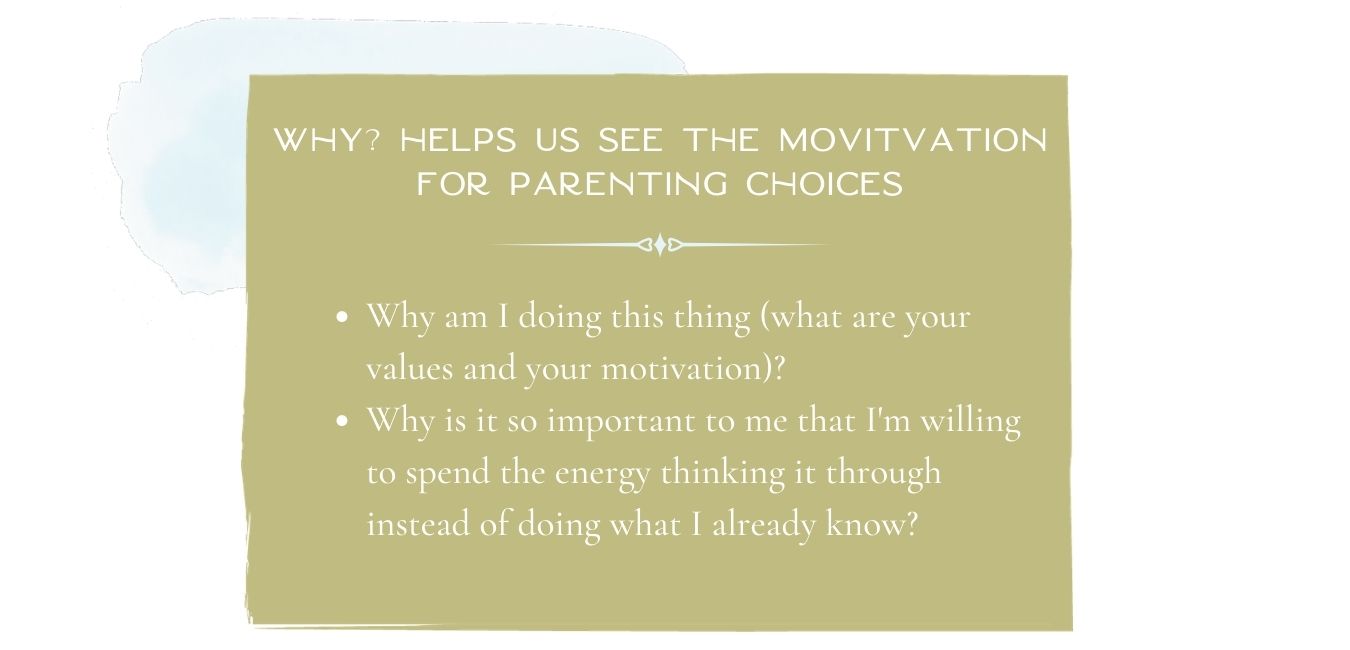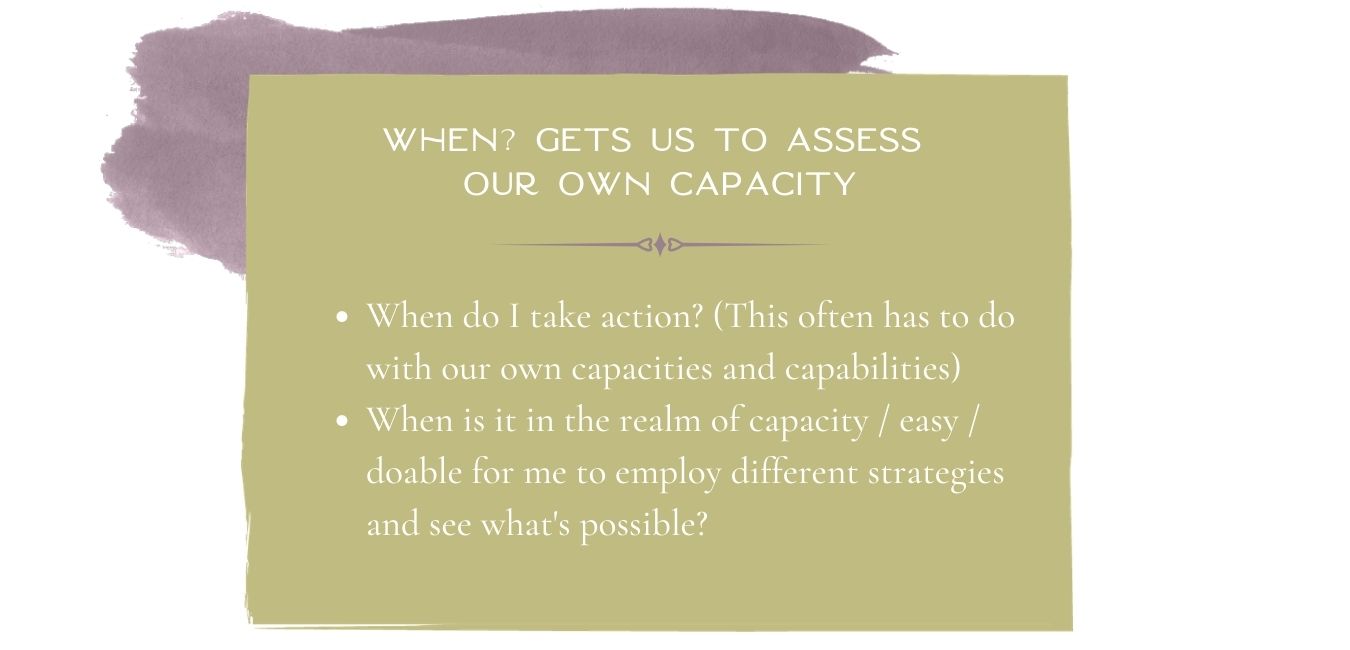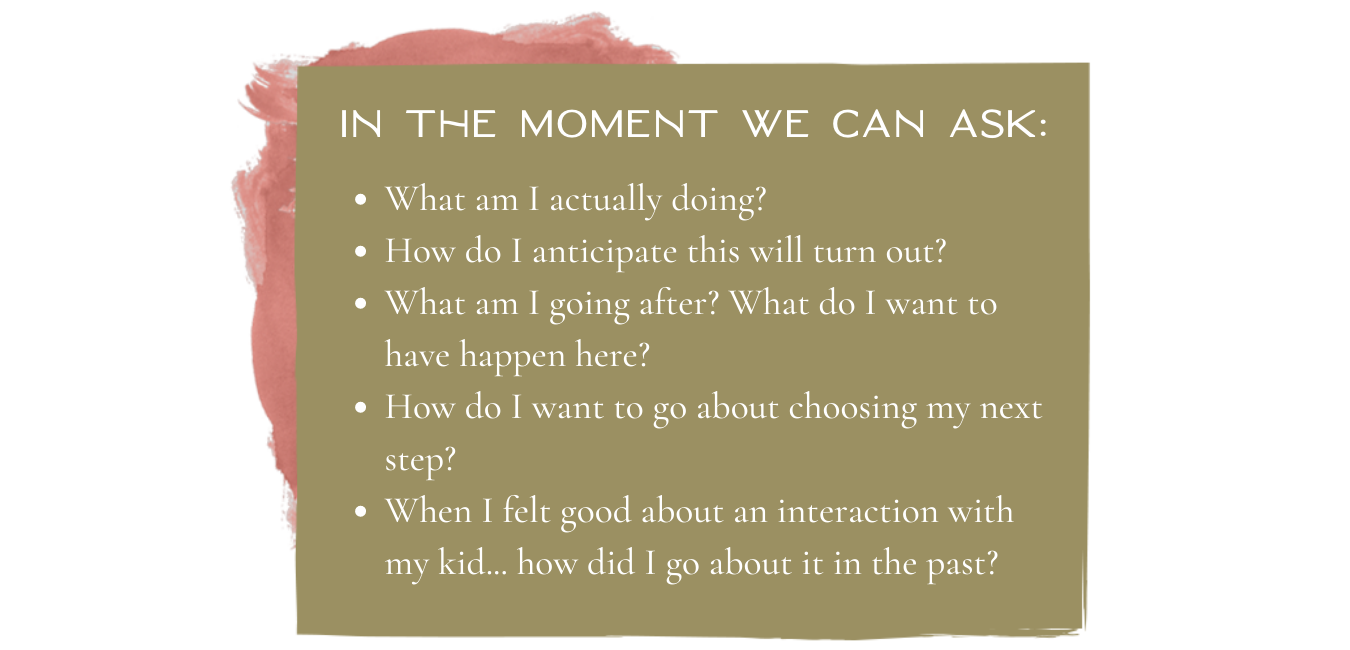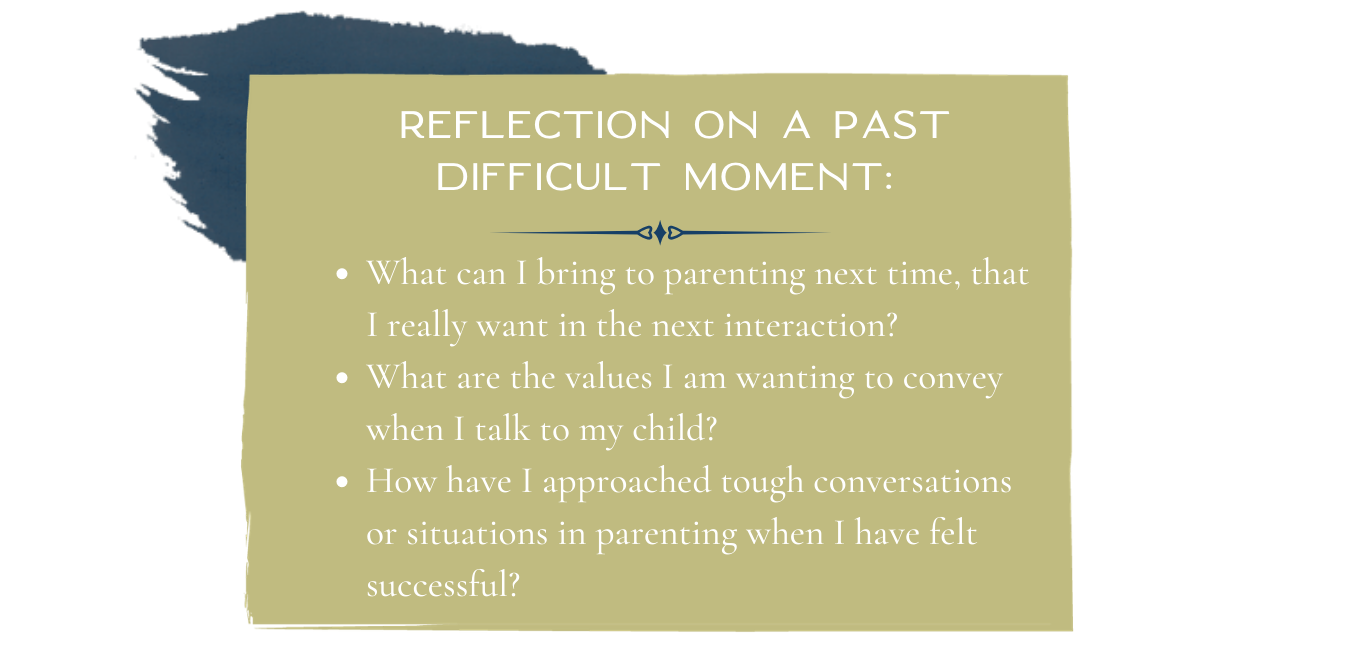|
For people who grow up under difficult circumstances having children can feel like a really big choice to make. And part of that choice depends on the confidence we have that we can do parenting differently than our parents did. But we CAN give our children a kind of childhood that feels healthier, with more good relationships and self-confidence than we had.
(If you'd rather watch the video than read, you can go to the Landscape of Mothers YouTube channel and watch this video). Once we find ourselves as parents it's likely that we're still struggling with some of the effects of our childhood experiences. We have internalized a lot of what we saw and understood when we were young and we don't know it's there anymore until we're exhausted, overwhelmed, and stretched too thin. And that's when all of our intentions to do things differently implode. We can't parent through our will anymore and we revert to the strategies our parents used because they are the most available in our tired brains. For some of us this turns into a bad cycle. One where we feel like we've failed, we're not doing a good enough job, and the shame and sense of failure overtake us. When we hear ourselves sounding like our parents, and the disappointment in our ability to parent arises, we might overcompensate. This cycle creates instability, a sense that we can't rely on ourselves to behave as we intend to, and for our children they become uncertain of what to expect from us. What we are really looking for is the stable ground in the middle where we are present to our own inner workings and feelings, as well as to the needs of our child in front of us. But how do we get there AND STAY THERE! Short answer is we don't always. But there is the possibility of being on that stable present parenting ground much of the time (enough of the time that our children can form some expectations around their needs being met). The enemy of the solid ground is the shame and urgency that comes when we blow up and do or say something we regret. We've treated our children like we were treated, instead of from what's really important to us. There's a deep discomfort that we want to get away from. So we're likely to try to patch things up as quickly as possible through overcompensating. This tends to feel yucky too, so we try to move on as fast as possible. But what we all most need in that moment is presence. We need that for ourselves, and our kids need it from us. Our ally here is, paradoxically, slowing down. It helps to drop any pieces of urgency that we can, that are coming from our desire to rush past this discomfort, and to sit with it a moment. When we develop an Inner Mother who is capable of tending to our own disappointment and discomfort we are doubling down on that solid ground we are always trying to cultivate. We are bringing our distressed Inner Child to that landscape, as well as our child in front of us. This is growing up with our children. This is why having children can be considered a spiritual practice. This is why it can be healing for those of us with relational wounds from our family of origin to have children. There are other ways to do it, but if you find yourself in this cycle of "up and down" parenting know that this dedication to parenting through presence and relationship is healing to your Inner Child, your family line, and to your ancestors. It is doing repair on many levels. Parenting from this solid ground with presence is the best way to build a relationship with your children that will last through the developmental stages as they grow, and on into their adult years. Most often when I hear of people who aren't in contact with their parents anymore it's because these relational tasks were left undone. Because they rushed past the difficulties and wounds of parent-child relationships, and the adult children feel like their parents don't see or acknowledge their experience. If this feels like a struggle that you see in your friends, please forward this post to them to let them know they're not alone. And if this is you, and you want some structure for this journey you can find my mentoring services on my website.
0 Comments
At face value that's obvious. But how often do you give up yourself in order to meet someone else's needs? How often does some part of you that has needs, feel abandoned and left behind?
I'm not saying to only ever consider yourself. I am saying that caregivers and parents are often put in positions where they have to tend to someone else's needs before they take care of their own. I am saying that when we grew up being the one who got into a pattern of letting go of (or ignoring) our own needs so that we could keep someone else (usually parents) to be calm or take care of business, we can get used to not tending to ourselves. Not tending ourselves is not sustainable. That's where burnout happens. That's where we revert to the behaviors we are most familiar with. That's why, even when we are trying to hard to parent differently than how we were raised, we end up sounding like our parents. We end up yelling or sulking or manipulating just like they did. And, if you're like me, it brings up grief and shame when I hear myself say some of the hurtful things they said. It feels like failure to end up behaving as they did even though I had such strong intentions to not repeat those wounds. But it's really not about being a "good parent" or a "bad parent," in most cases it's just about whether or not someone had the skills, tools, and good relationship modeling. It's about being able to be whole humans with good awareness and the desire to learn how to be together even when things are difficult. So when you find yourself sounding like your parents, and the grief and shame rolls in, know that you are likely over capacity and you are overriding your own needs. Compassion for yourself because you're managing a lot is the first step. It's ok if you mess up sometimes. It's part of being human. And your ability to do the relationship repair with your family members is part of creating strong ties. Don't leave yourself out. Taking care of you when you find yourself outside of your current capacity is not shameful, it is human. Tending to your relationships through your shifts in capacity is how you BECOME the person who is the parent you want to be. This is not accomplished through managing your behaviors and suppressing what's happening in you. Since the 1980's family therapists have recognized four different parenting styles and researched outcomes for children even into adulthood. The styles are authoritarian, authoritative, permissive, and neglectful. While other researchers went on to refine this and change the titles of the styles, I want to share what I think is most important about these studies collectively. 1. The degree to which parents support their children by guiding them through problem solving, being aware of what's going on for kids and involved in daily interactions, and by providing positive reinforcement has been shown to have positive impacts on children's behavior and academic performance. 2. The more parents tell their kids what to do and think, the more likely the kids will be behave in aggressive and controlling ways with their peers. They are likely to have low awareness of their emotional state or the emotions of others, lack empathy, and resort to control as way to interact with others. This makes sense, right? We treat others as we've been treated because it's the set of strategies we learned to interact with. 3. There is an insidious nature of neglect in which without rules or support, the child is seen as a resource for the adults to get their own needs met. The child is left feeling unseen, unvalidated, and has no framework for creating their sense of self. This can lead to co-dependency, and extraction of the energy of the child for the benefit of the parent. So, just because we're not brutalizing our children doesn't mean we don't hurt them. 4. These are somewhat artificial delineations. While some parents may employ some strategies more than others, know that it's possible, likely even, that a given parent may use all of these strategies at different times depending on their own capacity. The corollary to that is that even "good" parents sometimes punish or don't meet their kids' need for support sometimes. WHY DOES THIS MATTER? I am increasingly hearing public conversations about estrangement in which adult children and their parents disagree on the cause of separations. I'm not saying one side is right and the other is wrong, but it strikes me that there is a consistent lack of listening to each other's perceptions that keeps reconciliation off the table. Both sides appear to me to just be screaming to be heard and acknowledged in their perception. So, why would this be happening? Because there was a lack of empathy, communication skills, and capacity to truly understand and be understood by one another that long predates the estrangement. There is a lot of blame, blatant expectation, and shaming happening. These are the ways humans go about trying to coerce someone to give them the type of attention they want when the direct request is either not made or not met. I believe so much strife is rooted in the internal framework we have around our roles, the expectations our parents have of us, and the stories we are told about who we are. We are also limited by the relational skills we may have never learned from our parents. When we examine our past experience, our current desires, and our relational skillset, we can find our way to a way of healthier relating that leaves us feeling like our families are our refuge from the harsh world. RESOURCES
In ecology we characterize how things work through the concepts of structure and function. Structure is the stuff we see when we ask ourselves WHAT or HOW. Structure is the behavior, the context, the goal, and our intent. It is how we approach a situation, what we bring when we come, and how we use our voice and our body to engage. Function is about the process, it is the flow and relating we hope to do when we come to a situation. It may overlap some with structure around our intent. WHY and WHEN are the questions that help us explore function. Sometimes these questions lead us back to our childhood pain. So, tread lightly here. The intention of asking these questions is not to retreat old painful pathways. Instead, what we want to do is skim off the surface of the facts. For me, I was alone a lot as a child. This was both because I grew up in the 1970's and 1980's when that was common... and because I suffered some big traumas during those years for which I did not receive help. Therefore, I have deep values for presence, connection, and being helpful (with consent). To ask HOW and WHAT we are investigating the structures, environment, and context of our parenting choices. When we ask WHY and WHEN we are locating our values, motivations, and assessing our capacity to show up fully for what's in front of us. The remaining questions of WHO and WHERE are relevant questions, that I'll answer when my next book comes out! Teaser: it has to do with where the relationships are (as in, is it a family relationship, community, or with yourself) and who else might be involved (a dependent, peers, or individuals in an hierarchy). This post is part of a video that I posted (LOM on YouTube) in a series on Landscape of Mothers Foundations. The topic is Structure and Function... and this post and the video are specifically about Structure. What we do and how we do it in our parenting relationship. When we enter a place in our parenting where we want to do things differently than what we have known, we are entering the unknown. It helps if we take a look at the places that we have done well in the past, or felt good about how we handled a situation, and we can apply what we know about what works to the new situation before us. I find it helpful to look at where things have gone well and ask myself a couple of questions about it. There are two parts to what we're investigating, the structure and the function. That is, we conjure a time in our minds in which we walked away feeling proud of how we handled some parenting moment... and we want to investigate the structure, or what was in place, what are the facts, and how it played out. We also want to understand that function, or why we did what we did, and what the context was. This video (LOM on YouTube) talks about the structure part of our inquiry. We're going to use the "Who, what, where, when, why, and how" questions... and the two particularly related to structure are WHAT and HOW. For me, I find that an approach that contains curiosity and questions is helpful (and so getting myself to that place before I approach my kids is crucial... and I really need to tie a string around my finger so I can remember it). As always, this requires some discernment. It requires that not only do I come with questions, but that I bring the presence of openness with them. Kids can tell when the question falls more along the lines of "what the hell are you thinking?" rather than, "hey, wanting to check in and ask about what happened yesterday. How do you feel?"
When we come to a situation where we're not sure what to do, or we have an urge to do it the way our parents would have (that wouldn't have felt good to us), we can take a pause and ask ourselves what we have done in times where the kids have responded well. If we already have answers because we've thought about it, we can respond better when a situation takes us by surprise. What does it mean to have regard for someone? For yourself? The origin of the word regard is Old French and is made up of “re-“ which means back, and “garder” which means “to guard”. Regarder (the Old French verb) means “to watch”. So, regarding is watching or seeing in a way that is protective, that circles back to safety. The way I think of it, regard is about allowing someone to have their full humanity. That includes the imperfections, the suffering, the disagreement, the joy and their right to choose their perspective. It means that they are not disposable, that it is not OK to shame or punish them, to tell them what their experience is, and it means that banishment or exile is not on the table. Regard does not, however, require me to agree with them. Holding someone in their humanity means that our fundamental orientation is that they deserve respect and dignity. If I disagree with them I do not have the right to infringe on their humanity. If I feel hurt by them I still do not have the right to infringe on their humanity. Regard is being able to set boundaries or make agreements without denying the humanity of any of the people involved. Regard is like love, in that it’s both a place we stand to see another person, and the way we behave toward them. Like love, if we don’t act in a way that lets the other person know how we feel, then they may not believe in our regard or love. Regard is both the things we hold to be true about someone from our vantage point, and our behavior that communicates our perspective to the other person. It is the acknowledgement of the person, and it is the circling back to the safety and validation of being held as a human worthy of respect. We can also have self-regard. This is the perspective that I hold for myself… one of self-compassion and acknowledgement of my own humanity. The associated behavior is treating myself with respect, honoring that I am having a (likely imperfect) human experience, but that I do not deserve to be shamed, abandoned, or punished… not even by myself. Self-regard holds me to treating myself respectfully, and it holds my inner dialogue to a standard of nourishment and protection rather than criticism and berating. The degrading voice in my head is not mine, it cannot coexist with self-regard. Ultimately, regard is embedded in a culture of shared humanity, care, and connection. It is also the bedrock of such a culture. Regard also feels like a lighthouse, a beacon, for how I want to be in the world. When I don’t know what to do, or how to handle a situation, I can ask myself what regard would look like if it were present… and I can do that. |
Author: Jill CliftonHi, I'm Jill, creator of Landscape of Mothers. I'm here to talk about breaking family patterns of harm so that we can parent our children in ways that support them becoming fully themselves. I'm happy to have you here! Archives
June 2024
Categories
All
|





 RSS Feed
RSS Feed